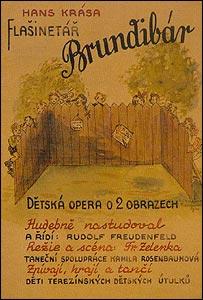 Master Ionarts and I read the book together a lot, and recently we have been able to revisit the music, in the world premiere recording of the Tony Kushner version, made by Music of Remembrance. That Seattle-based group has made performing music from the World War II era its specialty, especially music by composers killed in the Holocaust like Hans Krása, who was put to death as soon as he arrived at Auschwitz in 1944. This disc has quickly become Master Ionarts' preferred listening at meal times, and I will probably have to let him keep it in his room eventually. In the production we saw, the cast was entirely composed of children, as it was at Terezín. This recording uses all adult voices, meaning that the performances are all full-voiced and strong as a result, but the loss of the connection with the opera's fragile origins may be greater than what is gained. The only children's voices are the chorus parts, sung by the fine Northwest Boychoir, with a lovely Lullaby, for example, in the final act.
Master Ionarts and I read the book together a lot, and recently we have been able to revisit the music, in the world premiere recording of the Tony Kushner version, made by Music of Remembrance. That Seattle-based group has made performing music from the World War II era its specialty, especially music by composers killed in the Holocaust like Hans Krása, who was put to death as soon as he arrived at Auschwitz in 1944. This disc has quickly become Master Ionarts' preferred listening at meal times, and I will probably have to let him keep it in his room eventually. In the production we saw, the cast was entirely composed of children, as it was at Terezín. This recording uses all adult voices, meaning that the performances are all full-voiced and strong as a result, but the loss of the connection with the opera's fragile origins may be greater than what is gained. The only children's voices are the chorus parts, sung by the fine Northwest Boychoir, with a lovely Lullaby, for example, in the final act.The opera is only 31 minutes long, so it is supplemented on this disc with the Overture for Small Orchestra. It is possible that Krása was planning to use the piece, composed in 1943 to 1944, as an overture to Brundibár, although if true, that plan was never realized. The overture is scored for the same forces as the opera, including a large part for piano (Krása was a pianist). It is a nice little piece that would make a good introduction to the opera, for anyone out there thinking about performing Brundibár. The disc concludes with Lori Laitman's I Never Saw Another Butterfly, a cycle of six songs for soprano and clarinet offered here in its world premiere recording. The songs are set to poetry left behind by the children of the Terezín ghetto, preserved with their drawings. These precious documents, reproduced in a famous book from which this song cycle takes its title, are now housed in the United States Holocaust Memorial Museum here in Washington. The poems have been set to music many times, and as in most settings, the power of this cycle comes principally from the tragic tone of the words of children forced to understand horrible things.
Naxos 8.570119
UPDATE:
All is definitely not well at the Seattle Symphony, where the players have long been unhappy with their conductor, Gerard Schwarz, and the Board of Directors. [Lisa Hirsch]
No comments:
Post a Comment